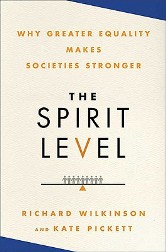
The Spirit Level: Why Greater Equality Makes Societies Stronger
by Richard Wilkinson and Kate Pickett
–Reviewed by Adam Fleisher
 Richard Wilkinson and Kate Pickett’s research shows that rich countries with high levels of internal wealth inequality have greater incidences of social problems than rich countries in which wealth is distributed more evenly. Their explanation? That inequality within countries causes social problems. That is, everything from obesity to lower life expectancies to higher incidences of crime and imprisonment and more is the direct result of “the scale of material differences between people within each society.”
Richard Wilkinson and Kate Pickett’s research shows that rich countries with high levels of internal wealth inequality have greater incidences of social problems than rich countries in which wealth is distributed more evenly. Their explanation? That inequality within countries causes social problems. That is, everything from obesity to lower life expectancies to higher incidences of crime and imprisonment and more is the direct result of “the scale of material differences between people within each society.”
Inequality causes social problems, the authors argue, because it “weakens community life, reduces trust, and increases violence” by setting in motion the forces that lead to class and social differences. Over time, “crude differences in wealth” translate into “differences in clothing, aesthetic taste, education, sense of self” and everything else that creates class identities. Social and class differences create anxiety, feelings of inadequacy and other psychological maladies. Even if no one wants for necessities in rich countries, the drive for “social appearances and position” creates a practically “neurotic need to shop and consume.” Those who are unable to keep up – that is, the poor – are humiliated because they are “looked down on and disrespected.” In other words, our problems are not material but spiritual.
Wilkinson and Pickett argues that we have to get over our obsession with the wealthy – our mistaken belief that they are “scarce and precious members of a superior race of more intelligent beings on whom the rest of us are dependent.” Short of that, they say the “growing body of evidence of the harm inflicted by inequality” will over time change public opinion, which will in turn encourage the implementation of policies that will narrow inequality. Alas, The Spirit Level offers run-of-the-mill suggestions, like forming trade unions and weakening corporate power while creating employee ownership schemes.
Indeed, most radical claim the authors make is not in their proffered solutions for inequality, but rather in their claim that “economic growth, for so long the great engine of progress, has…largely finished its work.” (As for the developing world, growth still matters, because it’s still important to raise living standards so that fewer people lack access to water, food, and shelter.) We “continue to pursue economic growth despite its apparent lack of benefits” because we feel the need to consume – and consumption evidently drives growth in the authors’ minds.
That economic growth won’t be missed is a tremendous relief, since, as the authors claim, governments have to slow growth “severely” to engender the massive cuts in carbon emissions necessary to save the planet from global warming. But The Spirit Level is a bit sketchy on the details of a world without economic growth. The authors seem to want to end only “unnecessary” consumption by increasing equality. They promise that we can enjoy our current standard of living, and still enjoy the relentless technological innovation of free market economies, without economic growth. But what is economic growth but the result of more efficiently allocating our resources as goods and services become less expensive thanks to technological change? And, if we didn’t want to consume anymore, and we already have everything we need, what would be the point of more innovation?
The first instinct of those who don’t like the results of freedom is to insist that the rest of us aren’t really free. In this case the authors seem to be well-meaning, but they are arguing not for “progress” but rather the end of it.
Excerpt: “So how do the stresses of adverse experiences in early life, of low social status and lack of social support make us unwell? The belief that the mind affects the body has been around since ancient times, and modern research has enhanced our understanding of the ways in which stress increases the risk of ill-health, and pleasure and happiness promote wellbeing. The psyche affects the neural system and in turn the immune system – when we’re stressed or depressed or feeling hostile we are far more likely to develop a host of bodily ills, including heart disease, infections and more rapid aging.”
Further Reading: The End Of Equality by Mickey Kaus and American Dream: Three Women, Ten Kids, and a Nation’s Drive to End Welfare
by Jason DeParle.
Adam Fleisher is a law student at the University of Virginia.
*Photo courtesy Damien Roue.




Send A Letter To the Editors